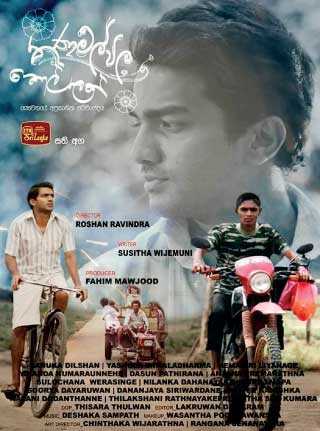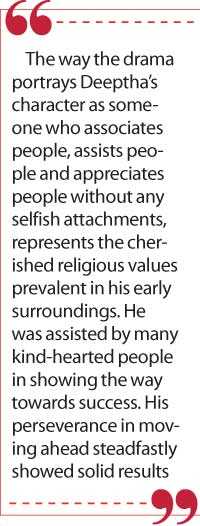Monday Feb 23, 2026
Monday Feb 23, 2026
Monday, 13 July 2020 00:20 - - {{hitsCtrl.values.hits}}
Amidst an avalanche of awful teledramas, you get a rare gem amongst the mundane. I had an enjoyable time watching one such rarity, particularly during COVID-19 related lockdown. It is titled ‘Thanamalvila Kollek’ (A lad from Thanamalvila). I saw much depth and breadth of unravelling a powerful ‘untold chapter’ (Aprakashitha Parichchedaya) of a rural youth going global amidst a multitude of challenges. It could be viewed as a rare rendering of rags to riches, in the modern-day context. Today’s column is a reflection of its significance for Sri Lankans. 
Overview
‘Thanamalvila Kollek’ is a recently concluded teledrama directed by a debutant director, Roshan Ravindra. He was a make-up artist, actor and a producer before. The way he connects Thanamalvila, Colombo and Paris in depicting a panoramic view, of a youth going, growing and glowing is indeed interesting and impactful.
The story is a narration of an untold chapter of Deeptha, a rural youngster who could not pass his ordinary level exam. Dhanuka Dilshan with his drama fame does full justice to the vibrant role. The way it was presented first with the settling in France and through flashbacks to scenes in Thanamalvila and Colombo, the struggling story of Deeptha is unfolding.
He inherits the knack of painting from his father, who is a traditional temple drawing artist. Deeptha’s untapped talent was spotted by Yasodhara, an educated lady who happened to be a friend of his sister, and the persuasion for him to embark on studies in visual and performing arts begins. He gets a job and comes to Colombo, and engages in the task of preserving old paintings. The western oriented people whom he meets in Colombo such as Maria, help him to further polish his artistic talent. He submits an entry into an art competition organised by a French institution. He won the first place and obtains a scholarship to go to Paris.
The lad from rural Thanamalvila who could have easily resorted to illegal means of making money in ruining prime youth, earns fame as a reputed artist, marries a Sri Lankan girl domiciled in France with her professional parents, and the life goes on.
The impressive story of Thanamalvila Kollek could be viewed from multiple perspectives. Let me attempt to do so with socio-economic, religio-cultural and psycho-dynamic angles, in doing justice for Deeptha’s dealings.
 Socio-economic perspective
Socio-economic perspective
Thanamalvila Divisional Secretariat of Moneragala District, of Uva Province is one of the poorest regions in the country. It amply highlights the urban-rural divide with relative deprivation of economic opportunities. Traditional Sinhala Buddhist society is prevalent with a sense of cast-consciousness. This is the classic setting where Susitha Wijemuni, the script writer has focused on. Studying beyond the GCE – Ordinary Level is a huge barrier for many youths, as realistically depicted in the drama. Deeptha becomes an exception thanks to the helping hand of Yasodhara, representing rich community having rural roots with a sense of social consciousness.
As the timing of the story is set in the backdrop of the Eelam War in Sri Lanka, the attraction of rural youth to the military as steady source of earning is also highlighted. The multi-faceted tragedies experienced by the south is symbolically depicted by the death of a close friend of Deeptha in the battlefront, and his elder brother losing his leg and becoming ‘differently abled’. Deeptha’s sister getting married to a newly rich man who works in Italy shows the dimension of rural youth crossing the economic poverty line through foreign earnings.
The way Deeptha’s friendly bunch of school deserters struggle to survive through illegal sand mining, and many other attempts highlight the stark economic realities. One of them deciding to become a Buddhist monk, after the sad episode where his mother’s sealed coffin was received from Dubai, having suffered as a deserted house-maid, showed the impermanent nature of life.
 Religio-cultural perspective
Religio-cultural perspective
The way several key characters are depicted is a symbolic representation of urban rural divide in Sri Lanka. The way Maria, a key player in old paintings restoration, assisting Deeptha in understanding some reputed painters’ masterpieces has been beautifully presented. One such reference is to Richard Don Gabriel, whose impressive painting decorates the background of the alter in St. Theresa’s Church, Thimbirigasyaya. Maria says the colours used by Richard closely resembles temple paintings, depicting his origins and eastern style. The way Deeptha harmonised traditional temple paintings and western abstract paintings, in enhancing his inherited artistic skills with the international exposure is indeed amazing.
The drama shows the shallowness of so-called famous personalities in the artistic circles who have teething issues in their relationships. For Deeptha, it is a stark contrast to the poor people he grew with in Thanamalvila, economically deprived yet having contented family lives. The cynical remark about Colombo that it can be either a gate for heaven or hell indicates the vises and virtues together prevalent in so-called high-class society of Sri Lanka.
It is interesting to see the diverse assistance Deeptha receives from Yasodhara, a devoted Buddhist who seemed to be suffering with a terminal illness and Maria, a devoted Catholic, who was busily preparing for her wedding. The street friend of Deeptha, with whom he discusses many aspects of life and society, advises him not to get overly attached to any person you come across in your life, depicting the religious wisdom, ‘attraction brings sorrow’.
Psycho-dynamic perspective
Deeptha’s success with artistic fame in breaking the barriers of poverty and its associated evils is a parallel to many such cases in positive psychology highlighting great achievements under challenging circumstances. It reminds me of the story of Sundar Pichai, the current CEO of Google.
It became much popular recently, how Sundar shared his humble origins, referring to how his father had to spend a year’s worth of salary on his flight ticket to America so that he could study at Stanford. He further said that it was the first time he sat on a plane, and the only thing other than luck that got him from there to where he is now, was his passion for technology and his open mindedness. He further said that while facing the challenges during his younger years, computing was the bright spot for him. As a boy growing up in Madras, Pichai slept with his brother in the living room of the cramped family home, but his father determined to give his children a good education.
It reminds me what Oprah Winfrey said. “I grew up in an environment where children were seen and not heard”. Celine Dion, the famous French-Canadian singer, well-known for her hit song ‘My heart will go on’ was also famously known to be the youngest child among 14 siblings, growing up rather poor. Deeptha’s story with Thanamalvila origin, settling in Paris could be a Sri Lankan equivalent to such many heard success stories.
The way the drama portrays Deeptha’s character as someone who associates people, assists people and appreciates people without any selfish attachments, represents the cherished religious values prevalent in his early surroundings. He was assisted by many kind-hearted people in showing the way towards success. His perseverance in moving ahead steadfastly showed solid results.
Way forward
“In life, you can blame a lot of people and you can wallow in self-pity, or you can pick yourself up and say, listen, I have to be responsible for myself”, so said Howard Schultz, a former CEO of Starbucks, who also had a difficult childhood amidst poverty. The wise use of scarce opportunities available for untapped talent to be unleashed is the key.
For me Thanamalvila Kollek is not just a tele-drama for mere entertainment. It shows the diverse facets of the Sri Lankan society with its urban-rural divide and the struggle of talented youth without proper guidance resulting in underdeveloped careers or underemployment complexities. Deeptha’s success story of rags to riches should be an encouragement for all with a positive mindset to face life as it is, in moving ahead with confidence.
It gives a clear message for policy makers and practitioners alike, on the need to provide opportunities to tap potential talent, not recognised in the conventional educational streams. Such a signal is much fitting to post-COVID-19 where economic challenges will demand the need to tap talent for fresh thinking and innovative solutions.
(The writer can be reached through [email protected], [email protected] or www.ajanthadharmasiri.info.)